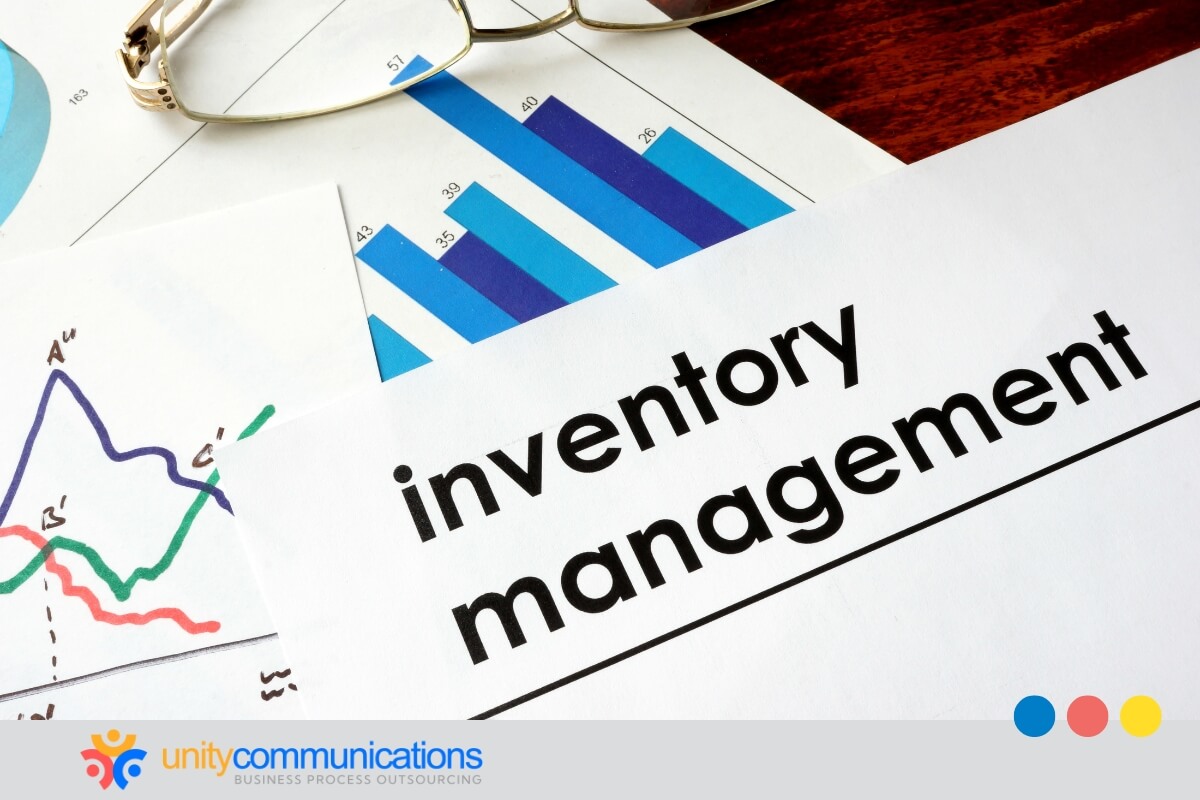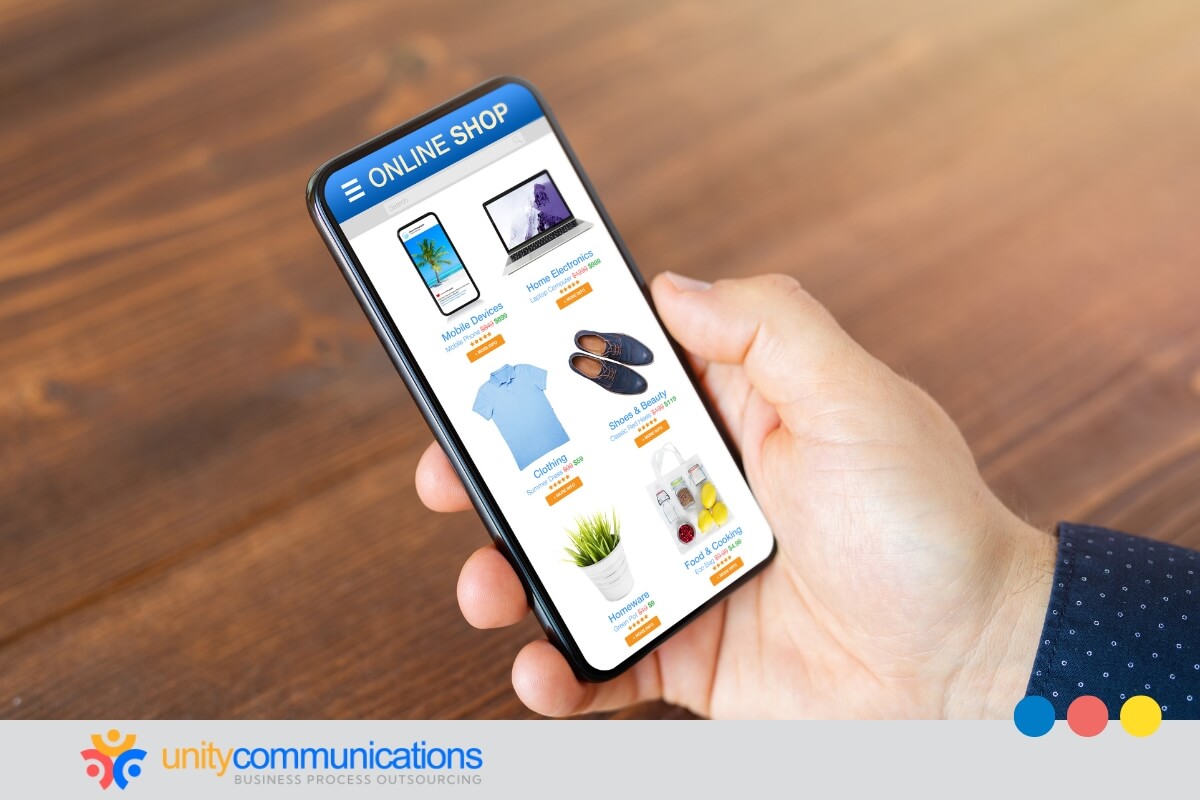Table of Contents
Learn more about outsourcing services for Phoenix businesses. Watch the video below.
The e-commerce landscape is rapidly evolving; businesses must adopt innovative strategies to stay competitive and expand their reach.
The vast U.S. market offers immense growth potential for Phoenix-based e-commerce businesses. One strategy that can assist online retailers with this endeavor is hiring third-party virtual assistants in Phoenix.
If you are curious how outsourcing helps Phoenix entrepreneurs expand operations to other parts of the U.S., this article is for you. It explores how local e-commerce businesses can ensure market growth by leveraging virtual assistants.
BPO in E-commerce

To better understand how Phoenix e-commerce businesses achieve market growth through third-party virtual assistants, let us first discuss what outsourcing is.
Business process outsourcing (BPO) involves contracting an external provider to handle specific processes. Its many benefits and services make it a widespread practice. According to Grand View Research, the global BPO market value reached $280.64 billion in 2022 and will expand by 9.4% until 2030.
Primary Benefits of Outsourcing
Partnering with a BPO provider can be a cost-efficient strategy for local e-commerce businesses. It provides the following advantages:
- Significant cost reductions. BPO providers help you save by providing a more affordable labor pool and eliminating expenses for office space, equipment, and utilities. Businesses that outsource report cutting expenses by 70% to 90% on this line item.
- Better access to expertise. Acquiring qualified labor may be challenging, considering Arizona’s tight labor market. Outsourcing lets you tap into a global talent pool that is skilled and well-versed in e-commerce trends, policies, and best practices.
- Advanced technologies. Digital transformation is one of the leading BPO trends and predictions. Outsourcing companies use the latest tools, such as artificial intelligence (AI) and cloud computing, to further streamline processes.
- Improved scalability and flexibility. Outsourcing lets your e-commerce business grow by scaling operations through readily available virtual assistants. Depending on customer demand, you can add or remove staff without compromising your financial health.
- Enhanced focus on core competencies. With more staff to share the work and tools to automate time-consuming and repetitive tasks, you can attend to more central activities. Some examples are product research and development, partnerships and investments, and customer journey improvements.
E-commerce Processes to Outsource
The most common functions online retailers outsource include:
- Customer service and support. Ensuring a positive consumer experience is crucial for any online shop’s growth. E-commerce customer service outsourcing helps businesses keep up with surging inquiries, increasing customer satisfaction. Unity Communications’ sales support case study perfectly illustrates this situation.
- Order processing and fulfillment. Receiving orders, verifying payments, packing products, shipping orders, and tracking shipments are tedious tasks. However, they are vital to your e-commerce growth. Delegating these tasks to virtual assistants helps streamline operations, reduce shipping costs, and improve delivery times.
- Inventory management. Virtual assistants can monitor inventory levels, supervise stock replenishments, and ensure the accuracy of product information. They also handle warehouse and return management. Thus, outsourcing optimizes inventory levels, prevents stockouts, and improves product availability.
- Information technology (IT) support and maintenance. Managing, troubleshooting, and updating technical systems requires specialized talent. IT BPO teams help maintain these networks. They also assist in operating your e-commerce website and developing data security and risk management strategies.
- Accounting and bookkeeping. Outsourcing financial processes helps prevent internal teams from getting overwhelmed, reducing the risk of costly errors and delays. Virtual assistants can manage records, prepare tax filings, and ensure federal and state regulatory compliance.
- Content creation and management. BPO providers also employ creative teams. You can rely on their virtual assistants to develop engaging and informative product descriptions, blog posts, and social media content. They can also help you update your website and marketing copy.
Growing U.S. E-commerce With Virtual Assistants

Online shopping has been a growing practice even before the pandemic. Due to global digitalization and rising Internet and smartphone use, e-commerce sales in 2022 exceeded $5.7 trillion.
As people become more connected through technology, e-commerce businesses must reach new audiences to remain competitive. Expanding nationwide allows them to:
- Access large and diverse markets
- Ensure long-term growth
- Reach new consumer demographics
- Keep up with the latest technologies and trends
- Improve brand presence, awareness, and reputation
- Diversify revenue streams
- Position themselves for global expansion
Phoenix’s robust logistics and distribution systems, trade programs, and exceptional infrastructure make this objective easier to attain. However, the city’s emergence as an e-commerce hub has made resources scarce and competition fierce.
Thus, outsourced e-commerce services have become popular among local online retailers to streamline and expedite U.S. market expansion. But how exactly does partnering with a BPO provider help with this endeavor? Let us discuss each point in detail.
1. In-depth Market Research and Insight
E-commerce outsourcing providers typically partner with local experts in different states. These connections give them insight into the trends and opportunities in other markets, which they teach their BPO teams.
With virtual assistants’ knowledge, your e-commerce business can tailor its products and growth strategies to local preferences. They can help ensure your initiatives resonate with specific regions, from customs to communication styles.
They have the expertise to assist you in all kinds of market research tasks, such as:
- Data gathering: conducting online surveys through social media and e-commerce platforms to learn customer patterns and behaviors
- Competitor analysis: checking competitors’ products, pricing, marketing strategies, and customer reviews
- Expansion opportunity research: analyzing demographics, economic indicators, and the e-commerce sectors in other states
- Market trend identification: monitoring industry news, best practices, and emerging technologies
- Market reports and presentations: summarizing research findings for better decision-making
Additionally, they leverage state-of-the-art technologies to streamline these tasks. Aside from AI and cloud computing, they use the following:
- Market research tools to efficiently collect large amounts of data
- Data analytics software to analyze large datasets and uncover patterns and insights
- Business intelligence (BI) tools for data interpretation, visualization, and reporting
- Web analytics tools to track website traffic, user behavior, and conversion rates
- Customer relationship management (CRM) systems to track customer interactions, preferences, and purchase history
- Social media analytics tools to track customer sentiment, brand mentions, and competitor activity
2. Round-the-Clock Operations
One of the many advantages of offshore or nearshore customer-centric outsourcing is the time zone difference. Working with a team whose office hours exceed those of Phoenix-based companies helps ensure continuous processes.
24/7 operations improve the online shopper’s journey. Here are its benefits:
- Reduced system downtime. A round-the-clock IT support team helps identify and mitigate risks that may occur beyond regular working hours. Resolving potential data security breaches or technical issues promptly reduces business disruptions.
- Improved inventory management and order fulfillment. Continuous monitoring of inventory levels and order processing ensures that products are always available for purchase and that orders are fulfilled promptly and accurately. This efficiency can reduce stockouts, minimize delays, and provide a seamless customer experience.
- Increased customer satisfaction. Accommodating customer inquiries is critical to ensuring your e-commerce business’s growth in the U.S. market. Virtual assistants leverage AI chatbots for common concerns, increasing loyalty and positive word-of-mouth.
3. Localized Content Marketing Strategies and Services
BPO teams study the regional dialects and slang of other U.S. states, allowing them to localize website content, marketing materials, and customer support.
Localizing your e-commerce business’s content and services ensures your brand message is evident across all regions. It also personalizes the customer journey, making consumers feel valued and connected.
Below are the different areas you can localize and how they can help your business grow:
- Content adaptation. Content BPO teams help localize your business’s materials for diverse U.S. audiences. They ensure content is culturally appropriate, linguistically accurate, and grammatically correct. It must also be aligned with local search engine optimization (SEO) best practices to enhance marketing visibility and effectiveness.
- Social media. Your e-commerce shop can grow its social media presence with the help of virtual assistants. They can tailor your content and interactions to resonate with local audiences. Social media localization is crucial for brand awareness since 77% of consumers report discovering shops through various platforms.
- Customer support. Outsourcing providers train their customer service representatives to understand and speak other states’ accents and slang. This skill helps them address inquiries and resolve issues promptly and effectively, reducing the risk of misinterpretations and misunderstandings.
4. Improved Security and Regulatory Compliance
E-commerce outsourcing providers have a shared responsibility and legal obligation regarding their clients’ data privacy. It is best to learn how to write a service-level agreement (SLA) for your BPO provider to ensure robust security measures, such as:
- Data encryption and access controls
- Payment gateways and fraud prevention
- Vulnerability assessment and penetration testing
- Network security and intrusion detection
- Employee security awareness and training
- Data backup and disaster recovery
- Regular security audits and reviews
Virtual assistants can also help with data privacy regulatory compliance, such as the California Consumer Privacy Act (CCPA).
They are also well-versed in federal and state laws regulating Phoenix-based businesses. They have the necessary expertise to navigate the complexities of other states’ regulations, including:
- Truth in advertising
- Fair competition and antitrust laws
- Consumer protection
- Telemarketing laws
- Product safety regulations
- State and local sales taxes
- Electronic Communication Privacy Act (ECPA)
- CAN-SPAM Act
- Fair Credit Reporting Act
- Intellectual Property (IP) laws
BPO teams help you stay up-to-date with these ever-evolving regulations to ensure that appropriate compliance measures are implemented. With the help of virtual assistants, your e-commerce business can avoid costly penalties that hinder its growth.
5. Accelerated Time to Market
Phoenix has the biggest full-truckload carrier in the U.S. By maximizing this feature and outsourcing e-commerce operations, your local business can enjoy the benefits of early market penetration.
Focusing more on core competencies, such as product development and sales, can reduce the time it takes to introduce your products to the market. Additional staff and resources for administrative tasks further expedite market penetration processes.
Here are a few advantages of a faster time to market:
- Gaining first-mover advantage. Your e-commerce business can become an industry leader by reaching U.S. customers earlier than competitors. It helps you gain brand recognition, establish customer loyalty, and shape market perceptions. This early entry can create a competitive edge and increase the likelihood of success in the U.S. market.
- Capturing early market share. Accelerated time to market allows your business to capitalize on emerging market trends. Recognizing and adapting to new trends enables you to gain a significant percentage of the U.S. market before competitors can react. This position can translate into long-term growth, success, and profitability.
- Responding to market demand. By getting products and services into customers’ hands sooner, your business can quickly gather valuable feedback. This timely insight loop enables you to identify areas for improvement, optimize product features, and refine marketing messages to better address market demand.
Emerging E-commerce Trends in the U.S. Market

In addition to e-commerce market growth and penetration strategies, virtual assistants can also help you keep up with trends. Some of the rising e-commerce practices include:
- Social commerce. The increasing popularity of social media among younger generations has led to the growth of social media shops. According to Grand View Research, social commerce sales in the U.S. reached $727.63 billion in 2022. Outsourcing social media management can help with this endeavor.
- Voice search. With Phoenix’s tech-savvy population, there’s no doubt about their use of voice search. From 2021 to 2023, Statista reported a 400% growth in global e-commerce sales through voice assistants. BPO teams can assist you in optimizing your website and e-commerce platform for voice search.
- Sustainability. Consumers are increasingly concerned about the environmental impact of their purchases. As a result, e-commerce retailers focus on sustainability initiatives, such as using eco-friendly packaging and offering sustainable shipping options. Less travel through outsourcing helps reduce carbon emissions.
- Targeted ads. AI and machine learning (ML) personalize customers’ shopping experiences. By outsourcing or focusing on marketing strategies, you can make targeted product recommendations that could lead to more sales. You can also personalize search results and offer tailored promotions.
- Short-form videos. TikToks, Instagram Reels, and YouTube shorts have become increasingly influential in attracting sales. According to Wyzowl, 91% of businesses said video marketing helped increase traffic. Delegating this task to BPO teams helps ensure the production of quality videos for ads.
- Mobile shopping. According to the Pew Research Center, 76% of adult Americans use their phones when shopping. Outsourcing web development tasks helps ensure your platforms’ mobile interface is user-friendly.
Staying ahead of these e-commerce trends allows you to strengthen your brand presence. It helps you reach new audiences through the Internet, which could initiate your U.S. market expansion endeavors.
The Bottom Line
The employment of virtual assistants presents a strategic opportunity for Phoenix-based e-commerce businesses to successfully expand in the U.S. market. Embracing the practice of outsourcing provides many services and benefits that help online shops with this endeavor.
From enhancing customer service to streamlining operations and providing personalized experiences, outsourcing can help you maintain a competitive edge. It allows e-commerce shops to position themselves for sustained growth and success in the ever-evolving industry.
Let’s connect if you want to learn more about e-commerce outsourcing. Unity Communications has been in the industry since 2009 and can provide valuable insights into the practice.




